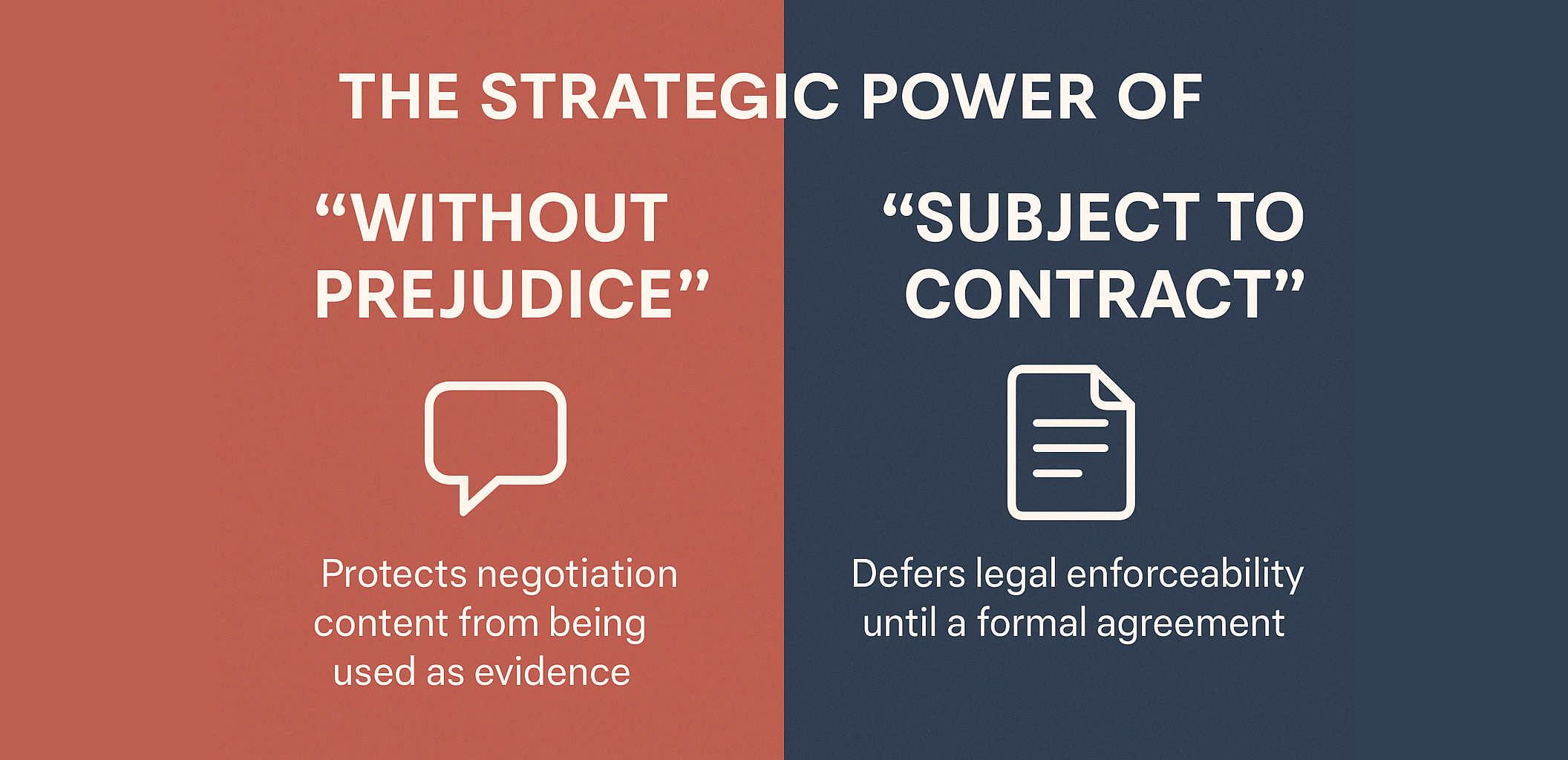“Without Prejudice” & “Subject to Contract”: How Offer Letters Protect Buyers and Sellers in Malaysia

An Offer to Purchase is the foundation of any property deal, yet it must balance flexibility with serious intent.
This is why legal professionals insist on including two critical cautionary phrases:
“Without Prejudice” (WP) and “Subject to Contract” (STC).
While these phrases may seem to weaken the document, they actually safeguard the negotiation process while firmly establishing the core commercial terms of the deal.
Why Use Cautionary Phrases on a Serious Offer?
| Phrase | Function | Primary Benefit |
|---|---|---|
| Without Prejudice (WP) | Protects negotiation content from being used as evidence in court or as admissions of liability. | Encourages parties to negotiate freely and explore settlement options without fear of legal reprisal. |
| Subject to Contract (STC) | Defers legal enforceability until a formal, detailed agreement (e.g., the SPA) is executed. | Prevents accidental contracts from being formed prematurely via informal correspondence (emails, messages). |
The Offer Letter’s Dual Role
An Offer Letter is a strategic document that fulfills two distinct roles:
- It Records the Commercial Skeleton (Binding Facts)
- It Declares the Legal Intent (Non-Binding Terms)
The strength of the Offer Letter lies in its ability to keep the core facts firm while maintaining flexibility on the legal details.
1. What Remains the Binding Foundation (The Skeleton)
Even with WP and STC clauses, the essential commercial facts of the deal remain definite reference points. Attempting to alter these later is effectively making a new offer, not revising the original one.
| Term | Example | Legal Significance (Binding Reference) |
|---|---|---|
| Identity of the Property | No. 18, Jalan Damai 3, Damansara | Defines the subject matter — both parties commit to this specific asset. |
| Offer Price | RM1,200,000 | The core financial term — the fixed basis for negotiation. |
| Tenure / Title Type | Freehold / Leasehold | Binding factual statement on the property’s legal status. |
| Size & Identity | Built-up 2,400 sq.ft / Land Area 3,000 sq.ft | Factual description grounding the valuation. |
| Parties’ Identity | John Doe (Buyer) / XYZ Bhd (Seller) | Establishes who has the serious intent to transact. |
These facts form the commercial backbone of the deal. They are binding reference points that survive negotiation and are later mirrored in the formal Sale and Purchase Agreement (SPA).
2. What Remains Negotiable (The Moving Parts)
The “Subject to Contract” clause mainly applies to the legal and financial details to be finalized later in the SPA.
- Deposit & Payment Milestones: Percentages, forfeiture, and refund rules.
- Completion Timeline: Settlement period and penalties for delay.
- Contingencies: Loan approval, due diligence, or State Authority consent.
- Chattels and Fixtures: Items included or excluded from the sale.
- Default Terms: Remedies and penalties for breach of contract.
These are flexible components, open for refinement during legal drafting.
Deconstructing the Legal Shields
1. The Protection of “Subject to Contract”
STC is the mechanism that postpones legal enforceability.
No one can be compelled to complete the sale or face a breach-of-contract claim until the SPA is duly signed.
It serves as a necessary buffer—giving both parties time to conduct due diligence, financing, valuation, and document verification without premature legal risk.
Key takeaway:
STC doesn’t nullify the offer; it merely postpones enforceability until the SPA is executed.
2. The Freedom of “Without Prejudice”
WP is an evidentiary rule that applies during disputes or negotiations. Its purpose is to encourage open and honest dialogue about settlement or pricing adjustments.
If negotiations fail, the rejected WP letter (such as a lower offer or proposed concession) cannot be used in court as proof that a party admitted liability or agreed to specific terms.
Key takeaway:
WP protects the words used in negotiation — not the facts being negotiated (like price or property address).
The Right Mindset
A well-drafted Offer Letter with these phrases creates a “safe sandbox” for negotiation:
- The sandcastle (core facts) is real — price, address, and property identity.
- The rules of the game (terms and timelines) remain flexible until formalization.
- The WP and STC labels protect each party from premature commitment or unintended legal exposure.
This balance encourages transparency, reduces friction, and allows professionals to refine terms efficiently before signing the SPA.
Final Verdict
Using “Without Prejudice” and “Subject to Contract” is a strategic safety measure—not a technicality. They don’t make your offer meaningless; they make it safer, clearer, and more professional.
They:
- Protect your negotiation language.
- Prevent premature enforceability.
- Preserve the commercial backbone of the deal.
Disclaimer
This article provides general educational information and does not constitute legal advice.
In most cases, adding “Without Prejudice” and “Subject to Contract” to an offer letter is prudent to protect both parties and maintain negotiation flexibility.
However, it is subject to case-by-case circumstances.
In certain transactions—especially when an Offer Letter is already comprehensive (effectively functioning as an SPA or tenancy agreement)—these clauses may be unnecessary or even inappropriate.
Always consult a qualified lawyer to review your offer letter or any property transaction documents to ensure the language accurately reflects your intentions and protects your position.











































































































